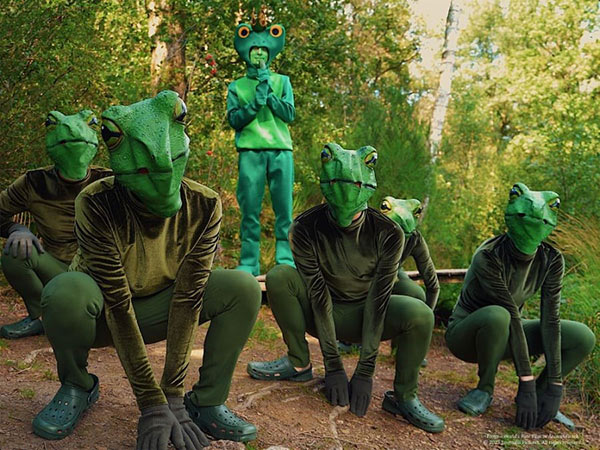“By recording the film entirely in spoken ancient Greek, we wanted to highlight the beauty and musicality of this ancient language”.
“Athens, 405 BC The city lacks talented poets. Consequently, the god Dionysus, accompanied by his slave Xanthia, embarks on a journey to the underworld to retrieve the famous tragic poet Euripides and save the city of Athens. Meanwhile, Heracles, the brother of Dionysus, is visited by King Admetus, who is mourning the recent loss of his wife Alcestis.”
Combining excerpts from Aristophanes’ Frogs, Euripides’ Alcestis, Plato’s Symposium and Frogfight, enriched with original content, the world’s first feature film entirely in the ancient Greek language is a fact. Titled ‘Frogs’, the Iuvenalis Pictures production is an amateur film made by volunteers and on a limited budget. The actors and crew of the non-professional production company are graduates of the Catholic University of Leuven (Belgium), specialized in classical languages and with a deep passion for ancient culture and the art of cinema.
“The inspiration for our film came from our undying passion for the language, literature and culture of Ancient Greece. As graduates in the field of Classical Studies (Ancient Greek and Latin), we felt an imperative need to support and promote the study of the ancient Greek language and its literature. With “Frogs” we aim to bring classic literature closer to a modern audience, while encouraging the study of all its aspects”, states Thibaut Lejeune to APE-MPE, speaking on behalf of Iuvenalis Pictures.
The PhD student in Ancient Greek, who “signs” the script and direction of the specific “Frogs”, also refers to the decision of the young classicists, graduates of the Catholic University of Leuven, to shoot a film entirely “in oral (and sung) Ancient Greek”. “On the one hand, he was motivated by the pursuit of historical accuracy and authenticity. Adapted stories and literary works, written in Ancient Greek, breathe life into these narratives, giving the film its unique character and originality, right through the language itself.
By staying as close as possible to the original works, including the language in which they were composed (more than 2,400 years ago), we hope to have “exonerate” the literature justice as much as possible. On the other hand, the possibility of creating a faithful but modern film adaptation of these original works in ancient Greek, underlines the lasting power and universal value that ancient Greek stories still hold in our modern society”, he emphasizes to APE-MPE.
The team, despite the low budget, used high-quality equipment during their filming in Italy and France in August and September 2021. After two years of meticulous editing, original music compositions by Nick Van Elsen and compelling sand art stories by Colette Dedyn, the film is ready to travel the world. The film screening will take place on September 18 in Athens, in collaboration with “Hellenic Education” (the screening will be by invitation and anyone interested can call the Foundation’s Secretariat). This will be followed by a free release on YouTube in October 2023.
“Thibaut Lejeune came into contact with ‘Hellenic Education’ at the recommendation of Euroclassica, a European organization that has been promoting classical letters in Europe for about 30 years. He asked for our participation in order to be able to promote the film to the Greek public, but also to all those who study or simply love the Greek language and culture. He considers that the film is somehow educational material in a field that is not so widely known, in the oral teaching of Ancient Greek.
In recent years the role of oral teaching is gaining more and more ground in the teaching of classical languages and there are numerous actions in countries such as England, Italy and Spain to add oral teaching to the course of Ancient Greek and Latin, so that the student to master the language as best as possible”, Evgenia Manolidou, head of the Greek Education Program, noted to APE-MPE. She added: “It is particularly moving that abroad, ‘literate Philhellenes’, as they describe themselves in the film’s prologue, are trying so fervently to master a language that for us is much easier, given that 80% of words are already known to us. I think that such actions are an example for all of us and we must support them in every way.”
The actors in the tragicomedy “Frogs” use the Erasmian accent, which closely aligns with the accent commonly used in countries such as Belgium and the Netherlands. However, a second version using the Greek accent was created in order to satisfy as many viewers as possible. This gives the audience the option to choose the pronunciation that best suits their preferences. At the film premiere in Athens, the second version has been selected.
“By recording the film entirely in spoken ancient Greek, we wanted to highlight the beauty and musicality of this ancient language. Also, the language and pronunciation heard in the film, may be of educational interest to anyone studying Ancient Greek, providing a ‘glimpse’ into what Ancient Greek might have sounded like and how stories, often widely read, might appear visually (especially if it is considered that they were texts intended not only for reading, but mainly for performance in the theater). We believe that the modern medium of a film is a captivating way that can stimulate the interest of modern audiences in ancient Greek stories and stimulate the study of Ancient Greek in secondary education.
Among our motivations is the desire to promote and spread the study of Ancient Greek worldwide, while providing teachers with educational audio-visual material, given the declining interest in the field, especially at the High School level. ‘Frogs’ is also accessible to the general public of all ages, without prior knowledge of ancient Greek culture”, concludes Thibaut Lejeune to APE-MPE.
Reference: www.dnews.gr

